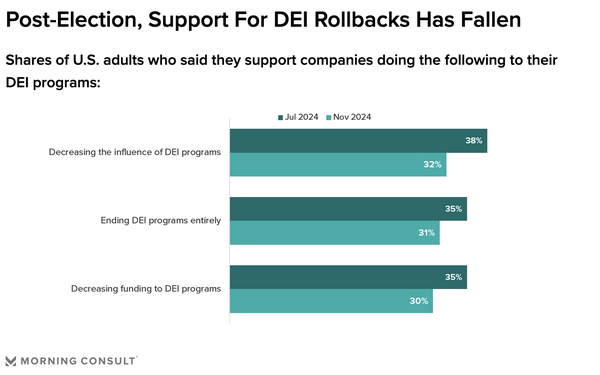
Target faced calls for
boycotts this week, including a protest outside its Minneapolis headquarters, after announcing last Friday that it would be rolling back many of its DEI initiatives.
The reaction to
Target’s moves underscores the degree to which consumers disapprove of brands for abandoning DEI principles a point underscored by a new report released this week by Morning Consult.
Entitled “How Americans Feel About Corporate America Abandoning DEI to Appease Trump,” the study was a quarterly survey of 2,200 U.S. adults.
According to the report, 67% of
U.S. adults said they believe speaking out on diversity and inclusion is “very important” or “somewhat important” – with even a slim majority of Republicans expressing
support. Morning Consult also cited research from late November 2024, which found that 60% U.S. adults said that DEI initiatives were important to business success, including 52% of
Republicans. Only 23% of respondents said that it was “not too important” to a brand’s business success.
advertisement
advertisement
“This data suggests that brands that abandon or curb
their existing DEI commitments in an attempt to satisfy the current crop of political leaders are doing so at the risk of long-term favorability among consumers,” Morning Consult wrote in the
report, adding that “it’s also generally not a best practice to take a position and then backtrack on it.”
According to the report’s findings, as of November, a
plurality of Americans oppose corporations rolling back DEI policies, “on par with the share who said the same in July 2024,” while support for such rollbacks has declined, So “less
than 1 in 3 U.S. adults favor brands reneging on DEI commitments” currently, according to Morning Consult.
Morning Consult’s findings align with another recent report by Cultural
Inclusion Accelerator and the ANA’s Alliance for Inclusive and Multicultural Marketing (AIMM), which found widespread support for inclusive marketing measures. Seventy percent of consumers
responded that in response to a brand reversing its DEI policies, they’d either “immediately stop purchasing/using” the brand's product, or continue to do so while seeking an
alternative more aligned with social causes they care about.
So why are brands abandoning DEI, then? “Ultimately, these actions are a reminder that brands take cues from different forces
at different times; right now, political forces are clearly trumping all else,” Morning Consult wrote in its report.
The Trump administration has made attacks on civil rights and DEI a
priority, including an executive order reversing Civil Rights protections put in place by the Johnson administration in 1965. Another executive order implying the administration will investigate
companies for their DEI policies was cited in a letter signed by 19 Republican state attorneys general to Costco CEO Ron Vachris, attempting to use implicit threats of legal action to pressure the
company into repealing its DEI policies.
Morning Consult noted that “consumers have yet to punish any brand over a DEI policy reversal” despite falling support for such rollbacks
– but Target’s high profile DEI withdrawal could change that.